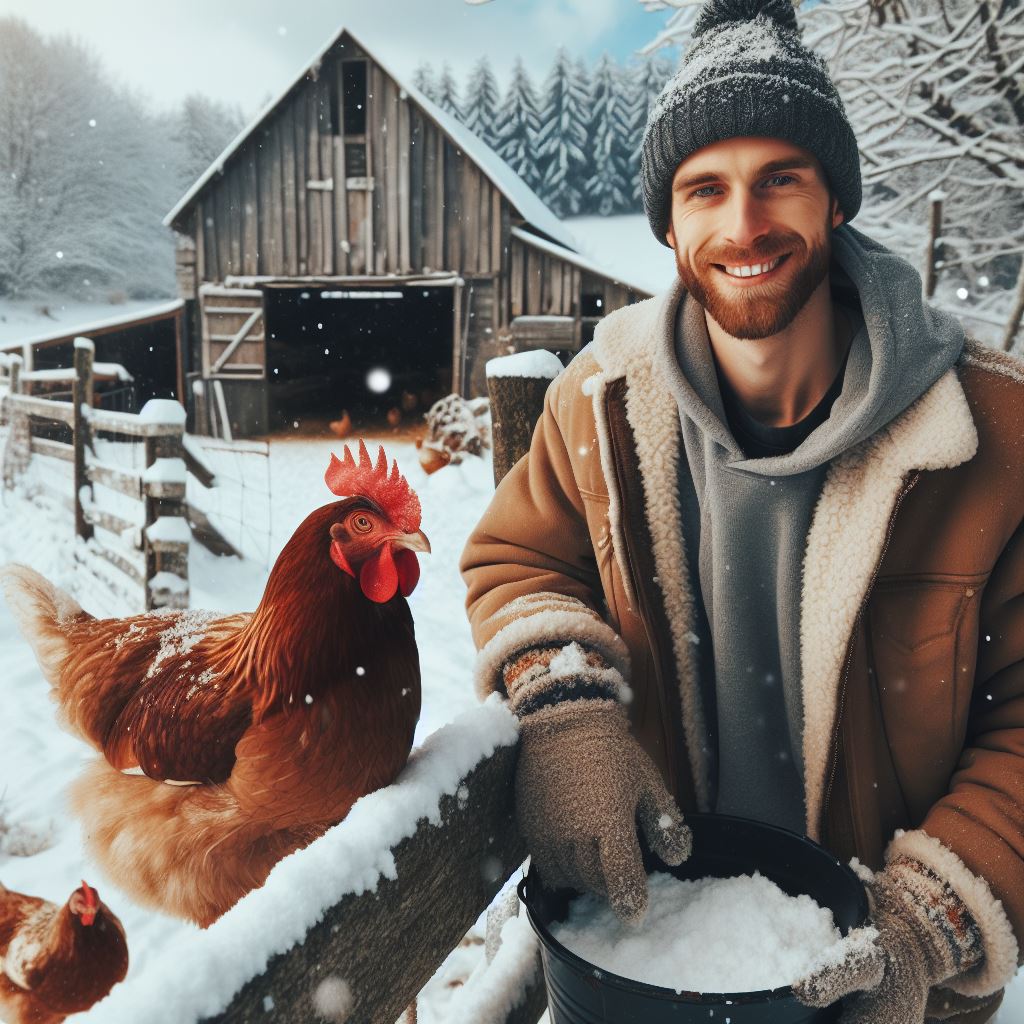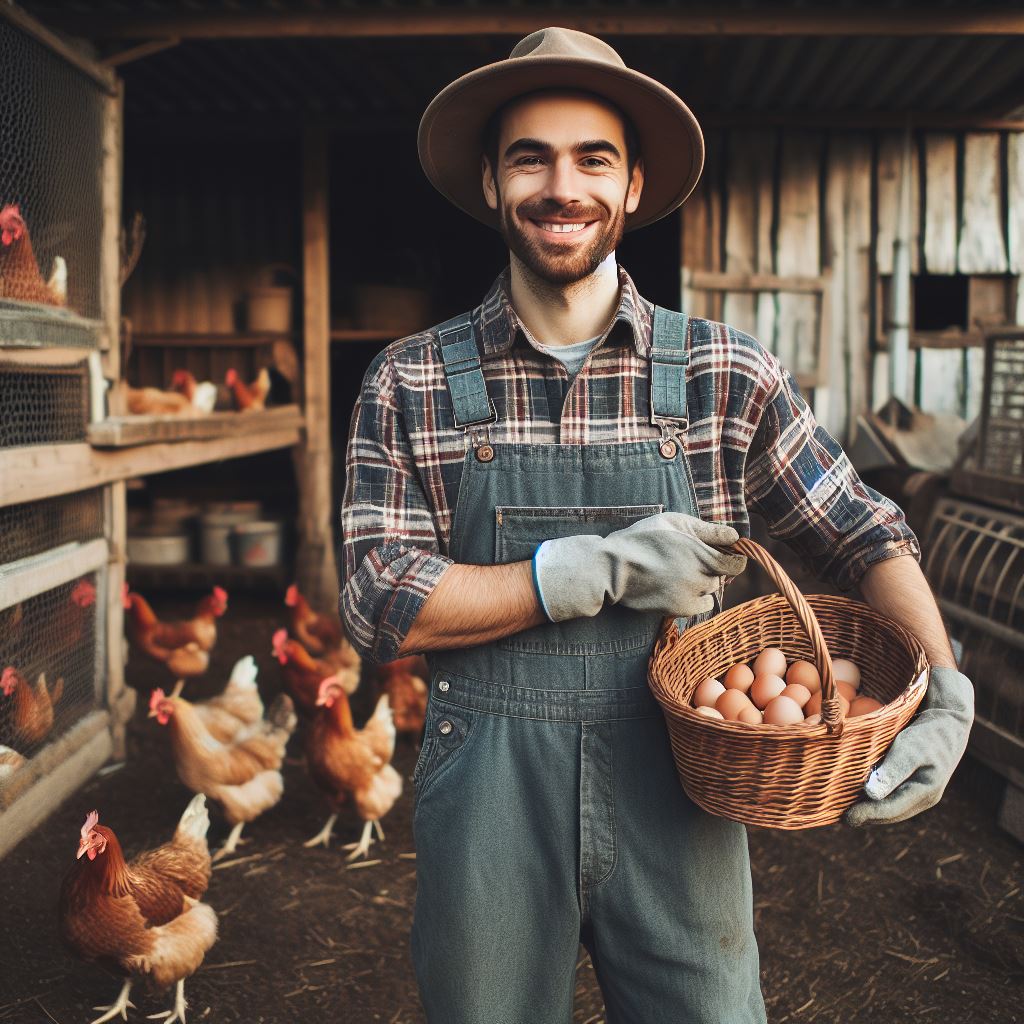Introduction
Ensuring the well-being and survival of your poultry flock during winter is crucial, and to assist you in this endeavor, here are some Winter Care Tips for Poultry Flock.
Winter care tips for poultry flock
Ensure poultry flock winter care by providing adequate shelter, insulation, and ventilation.
Offer warm water, nutritious feed, and check for frostbite on combs. Monitor health closely during cold weather.
Importance of taking proper care of poultry during winter
During winter, meticulous care of poultry is vital to safeguard their health and productivity.
Cold temperatures stress birds, affecting egg production and growth.
Adequate shelter, insulation, and proper nutrition prevent illnesses, ensuring the well-being of poultry and sustaining optimal egg yield, ultimately safeguarding the profitability of poultry farming.
Providing Shelter
Significance of a well-insulated coop for keeping poultry warm
When it comes to keeping your poultry flock warm and safe during the winter months, providing them with a well-insulated coop is crucial.
Here are some tips on how to do it:
Insulate the walls
Use materials like straw or hay to insulate the walls of the coop.
This will help trap heat inside and keep the birds warm.
Seal any gaps
Check for any gaps or cracks in the coop and seal them properly.
These openings can let in cold air and drafts, making it difficult for the birds to stay warm.
Provide a thick bedding
Layer the floor of the coop with plenty of bedding material, such as straw, pine shavings, or even dried leaves.
This will provide an extra layer of insulation and keep the birds off the cold floor.
Use insulation boards
Installing insulation boards on the walls and ceiling of the coop can provide extra protection against the cold.
Transform Your Agribusiness
Unlock your farm's potential with expert advice tailored to your needs. Get actionable steps that drive real results.
Get StartedThese boards are typically made of foam or fiberglass, which help retain heat.
Consider double-walled construction
If you’re building a new coop, consider using a double-walled construction.
This involves creating an air gap between the inner and outer walls, providing better insulation.
Importance of proper ventilation to prevent moisture buildup
In addition to insulation, proper ventilation is also essential to prevent moisture buildup inside the coop.
Here’s why:
Avoiding condensation
Proper ventilation helps prevent condensation from forming inside the coop.
Condensation can lead to dampness, which can be detrimental to the health of your birds.
Preventing respiratory issues
Moisture buildup in the coop can create a breeding ground for harmful bacteria and fungi, leading to respiratory problems in poultry.
Ventilation helps maintain a dry and healthy environment.
Regulating temperature
Ventilation allows for air exchange, regulating the temperature inside the coop.
It helps remove excess heat and humidity in the summer and prevents cold air from stagnating in the winter.
Eliminating odors
A well-ventilated coop helps eliminate unpleasant odors caused by manure and ammonia gases.
This not only improves air quality but also contributes to the overall well-being of the birds.
Remember, finding the right balance between insulation and ventilation is crucial.
Transform Your Agribusiness Online Presence
Stand out with compelling content tailored to engage your audience and drive results. From blog posts to social media, we’ll create what your business needs to grow.
Get StartedWhile you want to keep the birds warm, you don’t want to compromise on air quality.
Regularly inspect the coop to ensure proper insulation and ventilation throughout the winter season.
Read: Poultry Farming: Dealing with Predators
Feeding and Watering
During the winter season, it is important to provide your poultry flock with the proper nutrition and hydration to ensure their health and well-being.
Feeding and watering play a crucial role in their overall winter care. Here are some tips:
Feeding
A balanced and high-energy diet is essential for your poultry flock during the winter.
Due to the cold weather, they need extra calories to maintain their body heat.
- Increase their feed intake by providing them with high-quality and nutrient-dense feed.
- Consider adding extra protein sources to their regular feed to help them stay warm.
- Good sources of protein include mealworms, black soldier fly larvae, and soybean meal.
- These protein-rich additions will provide the necessary energy for their winter metabolism.
- Consult with a poultry nutritionist to determine the appropriate protein supplementation for your flock.
- Ensure that the feed is fresh and free from molds or pests that can harm your birds.
- Store the feed in a cool, dry place to maintain its nutritional value.
- Monitor their feed consumption and adjust the quantities accordingly to meet their energy needs.
- Observe their body condition to ensure they are not under or overeating.
- Feeding your poultry twice a day can help keep their metabolism active during the cold season.
Watering
Maintaining a constant supply of fresh water is crucial, even during the winter.
Dehydration can lead to numerous health issues for your flock, especially in dry winter conditions.
- Check their water source regularly to ensure it is not frozen.
- Consider using heated waterers or installing heat sources near their water supply to prevent freezing.
- Provide enough waterers for your whole flock to avoid competition and potential dehydration.
- If using heated waterers, carefully follow the manufacturer’s instructions for proper usage and safety.
- Offer lukewarm water to your birds instead of extremely cold water to keep their body temperature stable.
- Place the waterers in sheltered locations to prevent them from freezing quickly.
- Keep the waterers clean and free from ice or debris that could prevent your poultry from drinking.
- Regularly clean and sanitize the waterers to prevent the growth of harmful bacteria.
- Do not underestimate the importance of proper hydration during the winter months.
- Avoid using deep containers that can potentially drown young birds or cause ice accumulation.
By focusing on their feeding and watering needs, you can ensure that your poultry flock remains healthy, active, and productive throughout the winter season.
Providing a balanced and high-energy diet, supplementing with extra protein sources, and maintaining a constant supply of fresh water are essential for their well-being.
Remember to closely monitor their feed intake and water availability to make necessary adjustments as needed.
Read: Innovative Poultry Housing Solutions in 2024
Preventing Frostbite
Risks of Frostbite in Poultry during Winter
Frostbite is a common risk for poultry during winter.
Unlock Farming Insights for Growth
Make smarter farming decisions with detailed reports on market trends, weather patterns, and soil health tailored to your farm's success. Boost productivity with actionable data.
Get ReportLow temperatures combined with moisture can cause frostbite in their feet, legs, combs, and wattles.
Frostbite can lead to tissue damage, infection, and even death if not treated promptly
Tips on Preventing Frostbite
- Apply petroleum jelly on your poultry’s combs and wattles to provide a protective barrier against frostbite.
- Use breathable materials like straw or wood chips as bedding, which help insulate the feet from freezing ground.
- Consider providing additional insulation in the coop, using methods such as adding extra insulation or plastic sheeting.
- Avoid using heat sources like heat lamps or heaters, as they can be fire hazards and increase moisture levels.
- Ensure proper ventilation in the coop to remove excess humidity and prevent frostbite caused by condensation.
Importance of Keeping the Coop Clean and Free from Excess Moisture
- Clean the coop regularly to prevent the buildup of moisture, which can contribute to frostbite.
- Remove wet bedding, droppings, and any spilled water to maintain a dry environment.
- Provide a well-ventilated space to reduce humidity levels, preventing frostbite caused by condensation.
- Check for leaks in the coop’s roof or walls that may allow rain or snow to enter, leading to increased moisture levels.
- Ensure proper drainage around the coop to prevent water accumulation near the structure.
Essentially, preventing frostbite in your poultry flock during winter is crucial to their health and well-being.
By following these tips, such as applying petroleum jelly to combs and wattles, using suitable bedding material, and maintaining a clean and moisture-free coop, you can effectively minimize the risks of frostbite.
Remember, a healthy and comfortable flock is a happy flock, even during the coldest months of the year.
Read: Poultry Health: Preventing Common Diseases
Promoting Exercise
Exercise is crucial for poultry during the winter season to ensure their overall well-being and health.
Here are some ways to encourage exercise and provide a safe environment for your flock:
Provide Ample Space
Ensure that your poultry has enough space to move around freely.
Confined spaces can restrict their movement, leading to a sedentary lifestyle.
Design an Interesting Setup
Create an environment that stimulates your poultry’s natural instincts to explore.
This can include adding perches, ramps, and platforms to encourage movement and physical activity.
Scatter Food
Instead of placing food in a single location, scatter it around their living area.
This will encourage them to walk and peck, promoting exercise while foraging.
Create Obstacle Courses
Building obstacle courses with objects like logs, tunnels, and small ramps can engage your poultry both mentally and physically.
They will enjoy exploring and navigating through these challenges.
Incorporate Toys
Introduce toys such as hanging mirrors, hanging balls, or even treat-dispensing toys to keep your flock engaged and active during the winter.
Ensuring Safety
While allowing outdoor activities can be beneficial for your poultry, it is important to prioritize their safety:
Predators
Ensure that the outdoor area is predator-proof. Use appropriate fencing and netting to prevent any potential harm or attacks from predators.
Shelter
Provide a sheltered area outside where your poultry can retreat in case of extreme weather conditions or sudden changes in temperature.
Regular Supervision
Keep a close eye on your flock while they are exercising outdoors to prevent any accidents or injuries.
Regularly check their activity area to ensure there are no hazards.
Proper Bedding
Outdoor areas should have proper bedding to prevent injuries caused by slippery or uneven surfaces.
Straw or wood shavings can provide a suitable bedding option.
Mind Temperature Changes
Monitor weather conditions closely and avoid letting your poultry out during extremely cold or wet conditions.
Sudden temperature changes can be harmful to their health.
In general, promoting exercise for your poultry flock during the winter season is crucial for their physical and mental well-being.
By providing adequate space, interesting objects, and ensuring their safety, you can help them maintain an active and healthy lifestyle even in colder months.
Addressing Egg Production
Winter can have a significant impact on egg production in poultry, but there are several strategies you can implement to maintain production levels and ensure a constant supply of eggs throughout the season.
Providing Artificial Lighting
One effective method to counter the reduced daylight hours in winter is to provide artificial lighting in the coop.
This additional light stimulates the hens’ reproductive systems, encouraging them to continue laying eggs.
Bringing in the Warmth
Lower temperatures in winter can affect egg production.
Keep your coop properly insulated and use heat lamps or heating pads to maintain a warm environment for your flock.
Preventing Freezing
Collecting eggs frequently is crucial during winter to prevent freezing.
Cold temperatures can turn water droplets into ice, and frozen eggs can crack or become inedible.
Make it a habit to collect eggs at least twice a day.
Proper Storage
Once you have collected the eggs, it is important to store them correctly.
Place the eggs pointy side down in cartons and store them in a cool, dry place to extend their shelf life.
Adjusting Diet
In winter, when your flock may not have access to fresh grass and insects, it is important to adjust their diet accordingly.
Provide them with high-quality layer feed that is rich in nutrients to support egg production.
Supplementing Calcium
Calcium is a crucial nutrient for egg production.
During winter, when hens may not have as many options for calcium-rich foods, consider offering oyster shell or crushed eggshells as a supplement to ensure they receive enough calcium.
Managing Stress
Extreme weather conditions can induce stress in your flock, which can negatively impact egg production.
Ensure your coop is well-ventilated, provide fresh water regularly, and minimize disturbances to keep your hens stress-free.
Breed Selection
If you live in an area with harsh winters, choosing cold-hardy breeds that are known for their ability to lay eggs consistently in low temperatures can greatly benefit your egg production during the winter months.
Winterizing the Coop
Preparing your coop for winter is essential.
Insulate walls and windows to retain heat, cover draughty areas, and use bedding materials like straw or wood shavings to provide extra warmth.
Monitoring Egg Production
Regularly monitor the egg production of your flock during winter to identify any potential issues or changes.
This will help you take necessary steps to address any concerns and maintain optimal production levels.
In summary, winter can have a significant impact on egg production in poultry.
By providing artificial lighting, keeping the coop warm, preventing freezing, adjusting diet, and managing stress, you can maintain egg production throughout the winter season.
Additionally, proper storage, supplementing calcium, breed selection, winterizing the coop, and monitoring production will contribute to a healthy and productive flock during the colder months.
Read: Starting a Poultry Farm: Essential Steps & Tips

Health and Disease Prevention
Poultry can face several health issues during winter due to the harsh conditions and reduced immunity.
It is essential to take appropriate measures to prevent common diseases and ensure the well-being of your flock.
Potential Health Issues
- Respiratory Infections: Cold temperatures can weaken the respiratory system, leading to infections.
- Frostbite: Exposed combs, wattles, and feet are susceptible to frostbite, causing tissue damage.
- Dehydration: Birds may not drink enough water due to colder temperatures, resulting in dehydration.
- Vitamin Deficiencies: Limited access to fresh green forages can cause vitamin deficiencies.
- Parasitic Infestations: External and internal parasites thrive in damp winter conditions.
Prevention Measures
- Regular Cleaning: Keep the coop clean and dry to minimize the growth of harmful bacteria and parasites.
- Proper Ventilation: Ensure adequate airflow without creating drafts to prevent respiratory issues.
- Vaccination Schedules: Follow recommended vaccination protocols to protect against common diseases.
- Ample Bedding: Provide sufficient bedding material, like straw or wood shavings, for insulation and warmth.
- Warm and Dry Shelter: Provide a snug and waterproof shelter to protect the birds from extreme weather conditions.
- Access to Fresh Water: Regularly check and supply clean and unfrozen water to prevent dehydration.
- Supplementing Vitamins: Add vitamin supplements to their diet to compensate for reduced green forages.
- Parasite Control: Treat the flock with appropriate dewormers and pest control measures regularly.
Regular Health Check-ups
It is crucial to schedule regular health check-ups with a poultry veterinarian during winter.
These check-ups can help identify and address any underlying health concerns that may affect your flock.
The veterinarian can conduct thorough examinations, including checking for signs of respiratory issues, examining combs and wattles for frostbite, and conducting fecal tests to detect parasitic infestations.
Additionally, the veterinarian can provide guidance on vaccination schedules, recommend preventive treatments, and offer personalized advice based on the specific needs of your flock.
Remember, prevention is always better than cure.
By implementing these health measures and seeking professional advice, you can ensure the overall well-being and vitality of your poultry flock during the winter season.
Conclusion
Key points mentioned in the blog post
Overall, taking care of your poultry flock during the winter is essential for their well-being.
Encouragement for readers to implement these winter care tips for their poultry flock’s well-being
Remember to provide adequate shelter, insulation, and ventilation to keep them warm and dry.
It is also important to ensure they have access to fresh water and balanced nutrition.
Regularly check for signs of frostbite, respiratory issues, and other health concerns.
If necessary, consider using heat lamps or heated waterers to maintain optimal conditions.
By implementing these winter care tips, you can protect your poultry flock and ensure their health and productivity.
Call to action
We encourage you to share your own experiences or additional tips in the comments section below!
Together, we can create a valuable resource for winter care tips for poultry owners.




